Catering Services Market OverviewThe global catering services market is poised for substantial growth, driven by an increasing demand for food services in both corporate and private sectors. Rising disposable income, evolving consumer preferences for personalized dining experiences, and the growing trend of outsourcing food services in industries like hospitality, healthcare, and events are the key drivers. Catering services are expanding beyond traditional offerings to include more diverse and health-conscious options, such as vegan and gluten-free menus, reflecting the shift in consumer preferences toward healthier eating.This expanding market is also embracing technology, with digital tools and automation transforming service delivery and enhancing customer experiences. This includes the use of mobile apps for ordering, delivery tracking, and menu customization. Additionally, advancements in sustainability are driving market growth, with catering businesses incorporating eco-friendly practices such as reducing food waste, using biodegradable packaging, and sourcing locally produced ingredients.The outlook for the catering services market is optimistic, with several key trends and projections indicating continued growth through 2032:
-
Market Size: The global catering services market is expected to reach approximately USD 290 billion by 2032, reflecting a compound annual growth rate (CAGR) of about 7.2% from 2024 to 2032.
Growth Rate: 7.2%
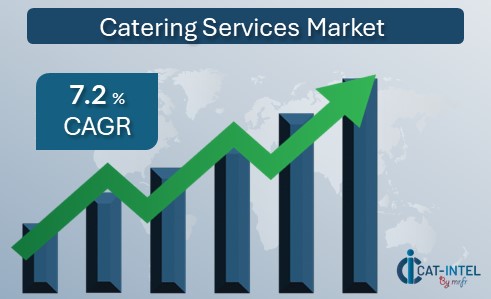 Sector Contributions:
Sector Contributions:
-
Corporate and Business Catering: With the increasing demand for employee welfare and corporate events, there is a rising need for catering services in office settings, conferences, and business meetings.
-
Event Catering: The demand for catering services in weddings, festivals, and other private events continues to rise, driven by consumer preference for convenience and high-quality food offerings.
-
Healthcare Catering: The healthcare sector is increasingly relying on outsourced catering services to meet the dietary needs of patients, offering tailored meal plans for specific health conditions.
Technological Transformation and InnovationsTechnology is playing an important role in revolutionizing the catering services market. The use of digital tools for meal customization, real-time tracking, and customer feedback is driving operational efficiency and improving customer satisfaction. Automation in food preparation and delivery is further contributing to the expansion of catering services, particularly in large-scale settings like corporate events and hospitals.
Funding Initiatives:Investments are flowing into innovative catering services, especially those focused on sustainability and health-conscious menus. Funders are particularly interested in catering businesses that incorporate local sourcing practices, eco-friendly packaging, and waste-reducing strategies.
Regional Insights:North America and Europe lead the catering services market, driven by high demand in corporate settings and event catering. However, the Asia-Pacific region is expected to witness rapid growth, especially in countries like China and India, where rising urbanization and disposable income are increasing the demand for professional catering services.
Key Trends and Sustainability Outlook
-
Sustainability Initiatives: Catering companies are increasingly adopting sustainability practices such as reducing food waste, sourcing sustainable ingredients, and using environmentally friendly packaging.
-
Health-Conscious Trends: The demand for healthier meal options is growing, with catering businesses offering vegan, vegetarian, gluten-free, and allergen-free options to meet dietary preferences.
-
Customization and Personalization: Clients are increasingly seeking personalized catering services that cater to specific tastes, dietary needs, and event themes, prompting businesses to offer more flexible and customizable menus.
Growth Drivers:
-
Health and Wellness: A growing awareness of nutrition and health is boosting the demand for healthier food options in catering services.
-
Corporate Demand: Companies are increasingly outsourcing their catering needs for employee meals, corporate meetings, and events, contributing to market growth.
-
Event Growth: With the increasing number of weddings, festivals, and private events, the demand for high-quality catering services is on the rise.
-
Sustainability Awareness: Catering services that focus on sustainable practices are gaining a competitive edge, attracting eco-conscious consumers and businesses.
Overview of Market Intelligence Services for the Catering Services MarketRecent market analysis shows fluctuations in pricing due to rising food costs and labour shortages, posing challenges to the catering services industry. Market intelligence reports provide essential cost forecasts and procurement strategies, helping stakeholders optimize purchasing decisions. These reports enable catering companies to manage cost volatility, ensure a consistent supply of quality ingredients, and streamline their operations. By leveraging procurement insights, catering businesses can enhance supplier relationships, reduce costs, and improve service delivery.
Procurement Intelligence for Catering services Market: Category Management and Strategic SourcingTo stay competitive in the Catering Services market, companies are focusing on strategic sourcing and category management. By leveraging spend analysis tools, procurement teams are identifying cost-saving opportunities and optimizing service delivery. Integrated service offerings from suppliers are becoming more common, requiring careful selection and negotiation. Emphasizing technological solutions, such as data analytics and procurement platforms, enhances efficiency and reduces costs. Best practices involve benchmarking to secure favourable terms and promoting collaboration across teams to improve service quality and meet stakeholder expectations.
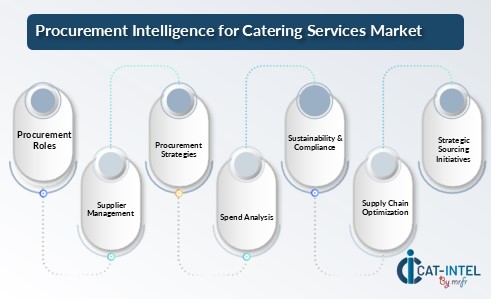 Pricing Outlook for Catering Services Market: Spend Analysis
Pricing Outlook for Catering Services Market: Spend AnalysisThe global catering services market is currently navigating a dynamic pricing environment characterized by fluctuating costs driven by key factors such as labour shortages, supply chain disruptions, and fluctuating food prices. These elements are influencing the overall pricing strategies within the market.
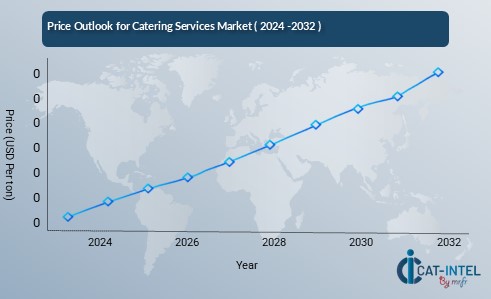
Our analysis highlights the following factors influencing the pricing outlook for the catering services market:
-
Rising Operational Costs: Labor costs and supply chain disruptions are driving up prices. The global workforce shortage is leading to wage increases, which are impacting catering service costs.
-
Surge in Demand: A growing demand for catering services in sectors like corporate events, healthcare, and education is exerting upward pressure on prices, especially in regions with rising disposable incomes.
-
Supply Chain Fluctuations: Ongoing disruptions in global supply chains, including food supply volatility and logistics challenges, continue to impact service costs, contributing to pricing fluctuations.
-
Technological Advancements: Adoption of digital tools and automation in catering services is helping companies optimize operational efficiencies, potentially mitigating price increases over the long term.
Cost Breakdown for Catering Services Market: Cost-Saving Opportunities 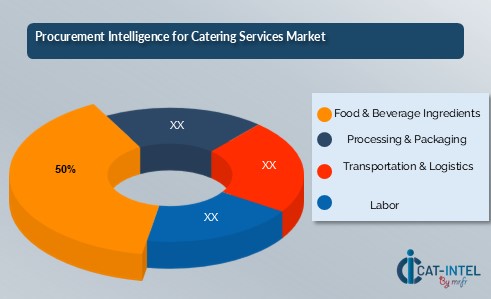
- Food & Beverage Ingredients (50%)
-
Description: This represents the bulk of costs in catering, encompassing the procurement of raw ingredients, beverages, and specialty food items, including organic and locally sourced ingredients. Ingredient prices fluctuate due to market conditions, availability, and seasonality.
-
Trends: Prices have risen recently due to supply chain disruptions, labour shortages, and rising commodity prices. Moreover, increasing demand for high-quality and specialty ingredients, such as plant-based alternatives, is pushing costs higher. The food service industry is also seeing price increases due to higher costs for meat and fresh produce.
- Labor (XX%)
- Processing & Packaging (XX%)
- Transportation & Logistics (XX%)
- Overheads (XX%)
Cost saving opportunity: Negotiation Lever and Purchasing Negotiation StrategiesIn the catering services market, optimizing procurement strategies can lead to significant cost savings. Key opportunities include bulk purchasing to secure discounts, consolidating suppliers to negotiate better terms, and sourcing seasonal ingredients to avoid price fluctuations. Additionally, reducing food waste through better inventory management and adopting sustainability practices like energy-efficient equipment can further cut costs. Technology integration for efficient order processing and optimizing delivery schedules also helps reduce operational overhead. These strategies collectively improve profitability while maintaining high-quality service.
 Supply and Demand Overview of the Catering Services Market: Demand-Supply Dynamics and Buyer Intelligence for Effective Supplier Relationship Management (SRM)
Supply and Demand Overview of the Catering Services Market: Demand-Supply Dynamics and Buyer Intelligence for Effective Supplier Relationship Management (SRM)The catering services market is evolving rapidly, driven by increasing demand for diverse food offerings, convenience, and customized dining experiences across various sectors such as corporate events, weddings, and healthcare.
Demand Factors:
-
Consumer Preferences: Rising demand for personalized, gourmet, and healthy food options, driven by changing tastes and dietary needs.
-
Corporate Events and Hospitality Sector: A growing number of corporate functions, conferences, and social events are expanding the need for catering services.
-
Health and Wellness Trends: The increasing awareness of health-conscious eating habits is pushing demand for organic, plant-based, and dietary-specific catering options.
-
E-commerce Growth: The rise of online ordering for catering services and home delivery platforms boosts demand, especially in the food service industry.
Supply Factors:
-
Local and Regional Suppliers: The catering industry depends on a network of local food producers, which can fluctuate based on supply chain disruptions, seasonal availability, and food trends.
-
Labor Availability: Skilled culinary staff and service professionals are essential for maintaining quality and service standards, with labour shortages affecting supply.
-
Sustainability and Sourcing: The adoption of sustainable practices, such as sourcing local ingredients and reducing food waste, impacts both supply and cost structures.
-
Competition and Innovation: The competitive nature of the market drives constant innovation in menu offerings and service delivery models, which influences pricing and supplier availability.
Regional Demand-Supply Outlook: Catering Services MarketThe catering services market is witnessing growth across several regions, driven by increasing demand for personalized services and the expansion of events and hospitality sectors. Here's a regional breakdown of the demand-supply dynamics in key markets:
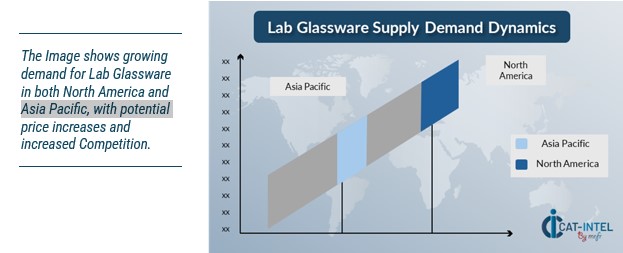 North America: A Dominant Market in Catering Services
North America: A Dominant Market in Catering Services North America, especially the U.S., is a major player in the catering services market. The region’s dominance is characterized by:
-
Strong Demand for Corporate Events and Private Parties: The corporate sector in North America continues to drive catering demand, with companies increasingly outsourcing food services for meetings, conferences, and events. There's also strong demand for catering in weddings and private gatherings.
-
Diverse Consumer Preferences: The region sees significant growth in demand for healthy, organic, and specialized diets, including plant-based and gluten-free options, influencing catering menus and service offerings.
-
Technological Integration: The adoption of digital platforms and food delivery apps is streamlining catering operations, enhancing convenience for customers and driving growth in online catering orders.
-
Sustainability Trends: U.S. caterers are embracing sustainable practices, sourcing local ingredients, and minimizing food waste to appeal to environmentally conscious consumers.
-
Competitive Market: Many catering companies competing for business has led to a diverse array of services and a focus on high-quality offerings and innovation in menu and presentation.
North America remains a key hub Catering services market and its growthSupplier Landscape: Supplier Negotiations and StrategiesThe catering services market has a diverse and evolving supplier landscape, catering to various segments such as hospitality, corporate events, healthcare, and educational institutions. Suppliers in this market provide essential equipment, food products, and services that are crucial for food preparation, presentation, and logistics.Key suppliers in the catering services market offer a range of products including catering equipment, food packaging, utensils, and food ingredients. They support industries with innovative solutions like grab-and-go meals, buffet equipment, and food merchandising. Notable suppliers include:Key suppliers in the catering services market include:
- Hubert
- Sysco Corporation
- Ecolab
- Cater Safe Solutions
- Tetra Pak
Key Development: Procurement Category significant development
Category |
Development |
Impact |
|
Supplier Diversity |
Growth in diverse supplier networks and local sourcing |
Increases flexibility and resilience in catering supply chains; reduces reliance on a few large suppliers. |
|
Sustainability Focus |
Adoption of sustainable sourcing practices |
Reduces environmental impact, aligns with consumer demand for eco-friendly products. |
|
Technology Integration |
Introduction of AI and IoT for inventory management |
Enhances operational efficiency, reduces waste, and improves cost control. |
|
Health & Safety Standards |
Heightened focus on food safety regulations |
Ensures compliance with health codes and increases customer trust in food service providers. |
|
Cost Efficiency |
Use of data analytics for procurement optimization |
Improves purchasing decisions, reduces overall procurement costs by identifying the best suppliers. |
|
Procurement Attribute/Metric |
Details |
Market Sizing |
The global catering services market is projected to grow from USD 130.4 billion in 2023 to USD 290 billion by 2032, at a CAGR of 7.2% during the forecast period. |
Adoption of Catering Services |
Growing demand for personalized catering, including specialized dietary options (e.g., vegan, gluten-free), particularly in corporate, healthcare, and event sectors. |
Top Strategies for 2024 |
Focus on technology integration (e.g., mobile ordering), offering health-conscious meals, and incorporating sustainable sourcing practices. |
Automation in Catering Services |
Increasing use of automation in inventory management, food delivery, and event catering to enhance efficiency. |
Procurement Challenges |
Rising food costs, maintaining quality and safety, logistics management, and sustainable sourcing are key challenges. |
Key Suppliers |
Leading players include Aramark, Compass Group, Sodexo, Delaware North, Elior Group, and Newrest Group. |
Key Regions Covered |
North America, Europe, and Asia-Pacific, with growth in the US, UK, Germany, and China due to increased demand for diverse catering solutions. |
Market Drivers and Trends |
Increased demand for personalized and dietary-specific catering, sustainable practices, and significant growth in the corporate and healthcare sectors. |
 Sector Contributions:
Sector Contributions: Pricing Outlook for Catering Services Market: Spend AnalysisThe global catering services market is currently navigating a dynamic pricing environment characterized by fluctuating costs driven by key factors such as labour shortages, supply chain disruptions, and fluctuating food prices. These elements are influencing the overall pricing strategies within the market.
Pricing Outlook for Catering Services Market: Spend AnalysisThe global catering services market is currently navigating a dynamic pricing environment characterized by fluctuating costs driven by key factors such as labour shortages, supply chain disruptions, and fluctuating food prices. These elements are influencing the overall pricing strategies within the market. Our analysis highlights the following factors influencing the pricing outlook for the catering services market:
Our analysis highlights the following factors influencing the pricing outlook for the catering services market:
 Supply and Demand Overview of the Catering Services Market: Demand-Supply Dynamics and Buyer Intelligence for Effective Supplier Relationship Management (SRM)The catering services market is evolving rapidly, driven by increasing demand for diverse food offerings, convenience, and customized dining experiences across various sectors such as corporate events, weddings, and healthcare.Demand Factors:
Supply and Demand Overview of the Catering Services Market: Demand-Supply Dynamics and Buyer Intelligence for Effective Supplier Relationship Management (SRM)The catering services market is evolving rapidly, driven by increasing demand for diverse food offerings, convenience, and customized dining experiences across various sectors such as corporate events, weddings, and healthcare.Demand Factors: North America: A Dominant Market in Catering Services North America, especially the U.S., is a major player in the catering services market. The region’s dominance is characterized by:
North America: A Dominant Market in Catering Services North America, especially the U.S., is a major player in the catering services market. The region’s dominance is characterized by:









